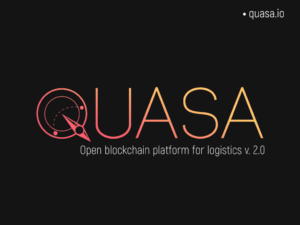
QUASA
QUASA implements a full cycle of freight traffic in the functionality of one application, using blockchain and smart contracts technology to eliminate the problem of trust, information barriers and court costs.
QUASA's trusted environment is the digital space of the QUASA platform, where trust is ensured through blockchain technologies, smart contracts and economic incentives for all participants.
QUASA infrastructure: a set of decentralized applications and services, as well as digital tools for building a business on the QUASA platform
Prototype of platform blockchain: - - https://www.quasa.net
ICO Details
- hiring of new employees and bearing the expenses related to the corresponding development;
- elaboration of the infrastructure for developing a logistics market 2.0 as well as developing the member community;
- 17% - overheads for launching preICO and ICO, bonuses for the developers
- legal costs and other bureaucratic expenses;
- bonuses for the founders and for the developers of the platform;
- repayment of borrowings used for creating the platform;
- 10% return on investments made by investors on the earliest stages of project;
- 8% - payment of PR services used at preICO, ICO, and Release stages
Own smart contracts: A key component of the QUASA blockchain-environment
Smart contracts QUASA work independently of the platform services. The effectiveness of smart contracts is based on the separation of functional and computing processes.
In the process of creating smart contracts, the following priorities and conditions were met:
- Reliability of performance of contracts (cleanliness of the code)
- Simplify the procedure for testing the smart contract code
- Works on expanding supported languages
QUASA provides a platform-marketplace for the dissemination of digital templates of contracts and agreements that have real legal value and validity in the blockchain environment.
QUASA offers a new model for the organization of cargo transportation and replaces all traditional platforms.
Each module for a certain type of transportation passes a single development cycle, consisting of a number of stages:
- Standardization of the order process
- Standardization of the service delivery process
- Standardization of the transaction process
Transparency and trust in the hybrid block environment QUASA is provided by a combination of technological solutions and authorization of users entering into business relations after the KYC procedure.
Absence of intermediaries, cost reduction and own crypto currency Quasacoin
QUASA offers a standardized API for building private ratings.
All ratings on the platform have integration with KYC. Participants and users of the system can be guided by the ratings when choosing partners.
Each transaction carried out on the platform is mutually evaluated and affects the reputation of the participants.
The cost of providing services and methods of payment are the main parameters of the effectiveness of the economic model QUASA
Most often, the cost of services is tightly tied to the main digital asset of the platform. However, such a binding has a negative side - with the popularity of the platform, the cost of services is also growing. This, in turn, changes its competitive advantages, worsens the potential and opportunities for real integration into business.
The basic economy of QUASA meets two main criteria:
- minimum volatility;
- Competitive cost of services
To ensure minimum volatility, tariffs are introduced for transactions and services of the QUASA blockchain-environment using the XDR (SDR) index. The IMF daily publishes the ratio of the XDR index (SDR) to the world's 20 major currencies.
Tokens become a prerequisite for using the service.
To use all modules and full functionality in QUASA, each connected company will need to use a set of services provided by the platform.
Payment methods are variable, the commission for services can be collected in percentage, be fixed, and can consist of any combination. There may be a zero commission, or there may be a commission payment at the expense of the seller, as in modern credit cards. In addition, "reverse commissions" are possible - material encouragement of users for transactions.
Monetization of QUASA services occurs at the last step of each successful delivery in the form of a payment, instantly increasing the demand for QUA tokens.
We have different ways to influence the growth in the value of QUA: each connected company is an information guide, every successful one is an even larger, louder information guide. Every time a company starts taking QUA, this is good news. We have a lot of such companies, and there will be many positive news, we will be constantly on hearing and will be able to influence the course.
The value of our currency will be provided by the real services provided by the QUASA platform, which will change the idea of cargo transportation.

Eugen Ambur

Bogdan Maslesa

Alejandra de Gaustad

Fabio Silva

Alexandr Surkov

Simon Cocking